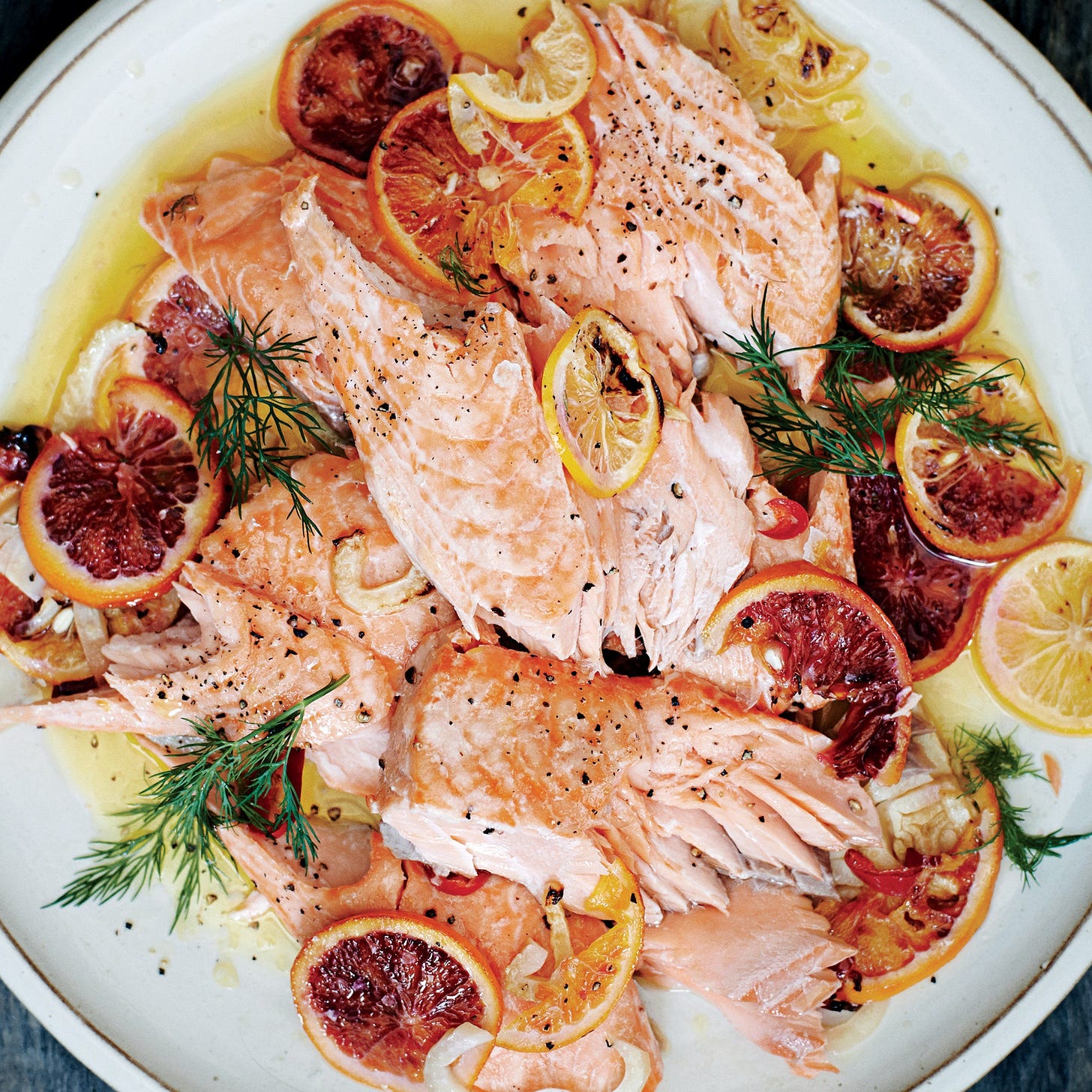Micah's Read of the Week, Vol. 82
Good news about COVID immunity, why we fail to keep our resolutions, finance bros game the system for NYC's hottest reservations, The Olympics, Austin's VC growth, Facebook, Recipe Corner, and more.
Hello, and welcome to Micah’s Read of the Week.
This is a newsletter filled with things Micah Wiener finds interesting.
Check out the archive of previous newsletters here.
Please, subscribe and share with a friend.
Estimated 73% of US now immune to omicron: Is that enough?
Let’s start with some good news!
The omicron wave that assaulted the United States this winter also bolstered its defenses, leaving enough protection against the coronavirus that future spikes will likely require much less — if any — dramatic disruption to society.
Woohoo!! Back to normal, please.
Millions of individual Americans’ immune systems now recognize the virus and are primed to fight it off if they encounter omicron, or even another variant.
About half of eligible Americans have received booster shots, there have been nearly 80 million confirmed infections overall and many more infections have never been reported. One influential model uses those factors and others to estimate that 73% of Americans are, for now, immune to omicron, the dominant variant, and that could rise to 80% by mid-March.
This will prevent or shorten new illnesses in protected people and reduce the amount of virus circulating overall, likely tamping down new waves. Hospitals will get a break from overwhelmed ICUs, experts agree.
“We have changed,” said Ali Mokdad, a professor of health metrics sciences at the University of Washington in Seattle. “We have been exposed to this virus and we know how to deal with it.”
The coronavirus — the current variant or future ones that are sure to pop up — remains a dangerous germ. It is still infecting more than 130,000 Americans and killing more than 2,000 every day. Tens of millions of people remain vulnerable. I tend to believe that we’ll be dealing with something like seasonal COVID for years to come, and the experts seem to agree.
There will be future outbreaks. The notion of a “herd immunity” that could stop the virus has slipped away under the harsh reality of new variants, waning immunity, and the rejection of vaccines by some Americans.
But the coronavirus is no longer new. Two years ago it arrived in a nation where nobody’s immune system had seen it before. The entire population — 330 million people — were immunologically naive, that is, susceptible to infection.
“I am optimistic even if we have a surge in summer, cases will go up, but hospitalizations and deaths will not,” said Mokdad, who works on the Institute for Health Metrics and Evaluation model, which calculated the 73% figure for The Associated Press.
Can’t stick to your New Year’s resolutions? It’s not just a willpower issue
80 percent of us have quit them by now. One researcher says we’ve been going at it all wrong.
Here’s a fascinating look into the psychology behind resolutions.
Q: Why is it so hard to keep resolutions about changing behavior?
A: We form habits when we repeat a behavior over and over in the same context, and we start to connect the context with that response. Once habits are formed, when you’re in that context again, the habit automatically springs to mind. It’s like standing in front of your sink in the morning, you just automatically pick up the toothbrush. You don’t ask yourself if you want to do it. Until we realize that habit memories don’t fade easily, we’re going to be constantly challenged with New Year’s resolutions.
Why do we fail?
A: We start off being really motivated, and then we find that it’s not all that easy. And so we get a little less motivated but the [bad] habit memory is still there. Ultimately, three weeks later or whenever we quit. At that point, our habit is still there, but our motivation has decreased to the point where we just sort of give in and do the old habit anyway.
So how do we become more successful?
A: Find some way to make the behavior enjoyable. If you hate going to the gym, you’re probably not going to go on a regular basis unless you can figure out some way to make it more fun — like listening to podcasts, going with a gym buddy or finding a different activity. Any of those could be more fun. And that’s going to help you keep your resolution.
Speaking of resolutions…
Did Micah practice yoga this week?
Yes. 60 minutes Sunday at Black Sheep Yoga. That’s 6 classes in 7 weeks this year. Shouts to BSY President Alex Earle. Great to see you!
Namaste.
Finance Bros Gamed the System for Hot Reservations — Until They Got Caught
This is a great story inside the rise and fall of #FreeRezy, an online group trading some of NYC’s most exclusive restaurant reservations. Check the lede:
A visit to Dhamaka takes some advance planning, but until recently, there was a way into one of Manhattan’s most buzzed-about spots that didn’t involve weeks of waiting or constantly checking for a cancellation. For those who were a part of an online group called #FreeRezy, getting a table at the city’s hottest Indian restaurant often came down to four words: “Dhamaka on Saturday please.”
Dhamaka releases its reservations at midnight each day, according to owner Roni Mazumdar. His customers often set alarms for the middle of the night — a month in advance — just to sit in his restaurant, or otherwise try their luck with Resy’s reservation waitlist system. As many as 1,500 people can be waiting for a cancellation each night, he says. Securing a spot can feel like winning the lottery.
#FreeRezy, which amassed and handed out reservations from dozens of Manhattan and Brooklyn restaurants, was a group chat based out of encrypted messaging platform Telegram. Online reservation exchanges have existed before, but this might be the first to offer them for free.
The group comes from Cole, Steve, and Sal, three former investment bankers who asked to be referred to by their first names in this article because they worry about repercussions in their industries. They say the system of making reservations is broken in New York City — even though two of them no longer live in the five boroughs — and thought they had the solution, until Resy shut them down in early February.
There’s some good history in the article about New York’s past reservation blowups. The best line in the piece:
Last month, after New Yorkers were exchanging $1,500 reservations on Reddit, Tock founder Nick Kokonas told Eater that the groups aren’t anything new. They pop up every few years, about as often as another generation of Goldman Sachs interns arrives in the city thinking they have a new idea.
The finance bros in the story serve as both the Robin Hood-like heroes and totally stereotypical douchebags. Seriously, check this quote:
According to Cole, the trio was looking to work on a side project last fall when it occurred to them: Getting a hot reservation typically requires advance planning, but with a small breach of Resy’s terms of service, it could be a lot easier. “The value to someone in the group is you don’t have to plan a month in advance,” he says. “People in their 20s have busy schedules.”
As for Steve, Cole, and Sal, the founders claim they have been banned from Resy, although the spokesperson for the platform says they are welcome to make new accounts, so long as they abide by the platform’s terms of service. In the end, it may be too much to ask for these former investment bankers.
“There’s always going to be drawbacks when you disrupt something,” according to Steve.
“I’d do it again,” Cole adds.
Local Brewery Instagram Post of the Week
This is true.
The Olympics are over, thankfully
I guess the Closing Ceremonies have already happened. Ok. Let’s get caught up on some big stories around the games. Let’s start with this one: ‘I hate this sport!’: Rage, teen tears and Olympic collapse. It includes our Lede of the Week:
BEIJING (AP) — The gold medalist said she felt empty. The silver medalist pledged never to skate again. The favorite left in tears without saying a word.
After one of the most dramatic nights in their sport’s history, Russia’s trio of teenage figure skating stars each enter an uncertain future.
Her Olympics and life turned upside down by a doping case, world record holder Kamila Valieva faces a possible ban and a coach whose first response to her disastrous skate Thursday was criticism.
“Why did you let it go? Why did you stop fighting?” cameras caught Eteri Tutberidze — the notoriously strict coach who will be investigated over Valieva’s failed drug test — telling the 15-year-old after she fell twice and dropped out of medal contention.
At least the IOC will take responsibility, right?
International Olympic Committee President Thomas Bach said he was disturbed by the intense pressure on the young skaters, particularly Valieva, and criticized her coaches without naming Tutberidze.
“When I afterwards saw how she was received by her closest entourage, with such, what appeared to be a tremendous coldness, it was chilling to see this,” he said at a news conference Friday. “Rather than giving her comfort, rather than to try to help her, you could feel this chilling atmosphere, this distance.”
Nice quote. Of course, the IOC did nothing.
Imagine dedicating your life to a sport, competing on the highest level, and then reaching the podium as the second-best person in the world in your field. That’s got to feel pretty good. Maybe not.
Runner-up Alexandra Trusova was also in despair after her history-making five quadruple jumps proved not enough to beat teammate Anna Shcherbakova to the gold medal. “I hate this sport,” she shouted at the side of the rink. “I won’t go onto the ice again.”
Ok then. Let’s check in on some other stories around the Olympics. A quick google search…
Oh my god.
From Finland skier suffers frozen penis in Olympics mass start race:
Lindholm spent just under an hour and 16 minutes traversing the course in howling, freezing winds, leading to his penis becoming frozen for the second time in a cross-country skiing race following a similar incident in Ruka, Finland last year.
“You can guess which body part was a little bit frozen when I finished (the men’s Olympic 50km race) … it was one of the worst competitions I’ve been in. It was just about battling through,” he told Finnish media.
Yeah. Sounds pretty bad!
Lindholm explained that he used a heat pack to try to thaw out his appendage once the race was over.
“When the body parts started to warm up after the finish, the pain was unbearable,” he added.
speaking of unbearable…
Facebook's obsession with everything 'meta' is getting annoying
Facebook is insufferable, part 210,093: They are now calling their employees Metamates.
The one guideline that will surely catch everyone's attention is the mention of "Meta, Metamates, Me," which Zuckerberg claims, "is about being good stewards of our company and mission.
It's about the sense of responsibility we have for our collective success and to each other as teammates. It's about taking care of our company and each other."
I guess Meta employees are now referred to by the company as "metamates," which is a continuation of Zuckerberg's insistence of distancing from anything "face" and focusing on everything "meta."
Just when you think Facebook couldn’t get any lamer, check out Zuck’s latest note:
The company formerly known as Facebook would like you to know that it's all about the metaverse. And it's not going to stop until the word is imprinted in your brain — even though no one is really sure what it means.
In a public note posted on Facebook and directed primarily at employees, Mark Zuckerberg, the co-founder of Facebook and CEO of its umbrella company Meta Platforms Inc, has outlined a new set of values that he believes the company's employees should adhere to.
Meta employees should "move fast," he wrote, "build awesome things," and "live in the future." They should also "focus on long-term impact," and "be direct" while respecting their colleagues.
Live in the future, Metamates!
Austin's big year for VC funding
Despite the pandemic and labor shortages, Austin's venture capital industry in 2021 continued to boom.
The big picture: Startup funding flowed in Austin last year, delivering 387 deals valued at a record-setting $4.9 billion — or 211% growth compared to the previous year — per data from PitchBook.
In the fourth quarter alone, Austin saw $924 million invested in 95 deals.
The big picture: It's a good time to be an entrepreneur in Austin, with more opportunities for VC firms, shorter funding cycles and bigger checks.
"If I had one prediction, I think 2022 is going to be another great year for Austin," Smerklo said.
5 Billion Dollars! That’s a lot of money flowing into local businesses and the Austin economy. Our market is booming, and we’re seeing this in tons of areas. Among the most impactful is housing. This isn’t a bubble.
So what does this all mean for you? If you don’t already own a home, now is the time to buy. These tech companies are going to keep growing and bringing more well-paying jobs to Austin. Don’t wait. Don’t miss out.
Get pre-qualified with me at micahwiener.com. Schedule a free mortgage consultation today. Free signed mousepad included with all pre-approval letters (for real).
Rates are going up and so is demand. You don’t need 20% down to win in this market. Pre-approval is the first step, and it would be my pleasure to help you and your family.
micahwiener.com | 512.695.5920 | micahwiener@me.com
Now, on to the recipes…
Recipe Corner
Slow-Roasted Salmon with Fennel, Citrus, and Chiles
Let’s take advantage of peak citrus szn with an easy weeknight dinner.
1 medium fennel bulb, thinly sliced
1 blood or navel orange, very thinly sliced, seeds removed
1 Meyer or regular lemon, very thinly sliced, seeds removed
1 red Fresno chile or jalapeño, with seeds, thinly sliced
4 sprigs dill, plus more for serving
Kosher salt and coarsely ground black pepper
1 2-lb. skinless salmon fillet, preferably center-cut
¾ cup olive oil
Flaky sea salt (such as Maldon)
Preheat oven to 275°. Toss fennel, orange slices, lemon slices, chile, and 4 dill sprigs in a shallow 3-qt. baking dish; season with kosher salt and pepper. Season salmon with kosher salt and place on top of fennel mixture. Pour oil over.
Roast until salmon is just cooked through (the tip of a knife will slide through easily and flesh will be slightly opaque), 30–40 minutes for medium-rare.
Transfer salmon to a platter, breaking it into large pieces as you go. Spoon fennel mixture and oil from baking dish over; discard dill sprigs. Season with sea salt and pepper and top with fresh dill sprigs.
Skillet caramelized cabbage with yogurt and dill
Since you’ve got the oven on anyway, you might as well roast some cabbage.
1 medium head green cabbage (about 2 1/2 pounds)
4 tablespoons olive oil, divided
1 medium yellow onion (about 8 ounces), halved and sliced
2 cloves garlic, minced or finely grated
1 teaspoon caraway seeds
1/2 teaspoon fine sea or table salt, plus more to taste
1/4 teaspoon freshly ground black pepper
1 1/2 cups low-sodium chicken or vegetable broth
1 tablespoon apple cider vinegar
1/4 cup fresh dill fronds
3/4 cup plain Greek yogurt (nonfat, low-fat or whole)
Position a rack in the middle of the oven and preheat to 350 degrees.
Cut the cabbage in half through the core, then cut each half into four wedges, making sure that each wedge retains some core to hold it together, so that you have 8 wedges.
In a large, ovenproof, high-sided skillet over medium-high heat, heat 1 tablespoon plus 1 1/2 teaspoons of the oil until shimmering. Add four wedges of cabbage to the skillet and sear until the cabbage is well browned and slightly softened, 3 to 4 minutes per side. Transfer the cabbage to a plate, and then repeat with another 1 tablespoon plus 1 1/2 teaspoons of the oil and the remaining cabbage, transferring the cabbage to the plate once browned.
Add the remaining 1 tablespoon of the oil to the same skillet. Add the onion and cook, stirring, until softened, about 3 minutes, then stir in the garlic and caraway and cook, stirring, until aromatic, 30 seconds more. Return the cabbage to the skillet, overlapping the wedges as needed. Season with the salt and pepper, then add the broth and vinegar and bring to a simmer.
Transfer the skillet to the oven and bake, uncovered, for 60 to 75 minutes, or until the cabbage is very tender and the liquid has reduced to about half.
Serve garnished with dill fronds and dollops of yogurt, and seasoned with additional salt, if desired.
More Micah
Podcasts: Mind of Micah, Back Door Cover, Too Much Dip
Twitter: @micahwiener & @producermicah (Why two twitters? It’s a long story)
Mortgage Inquiries: savewithmicah.com
Instagram: @micahwiener
LinkedIn: @micahwiener
Peloton: #badboysofpelly @micahwiener
Email: micahwiener@me.com
NMLS #2090158, equal housing lender.











